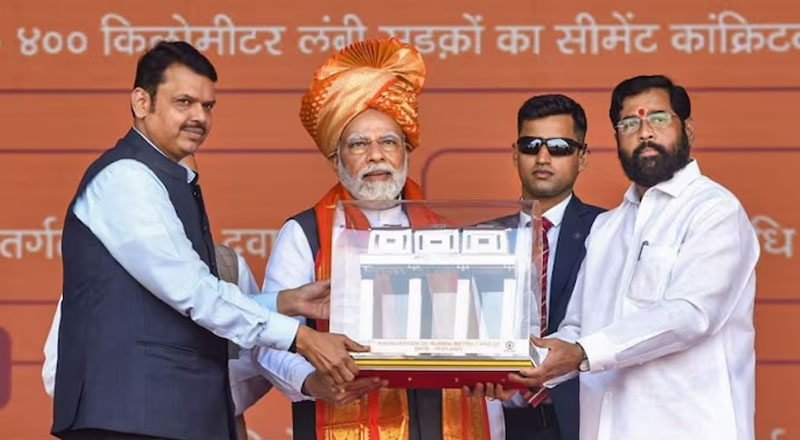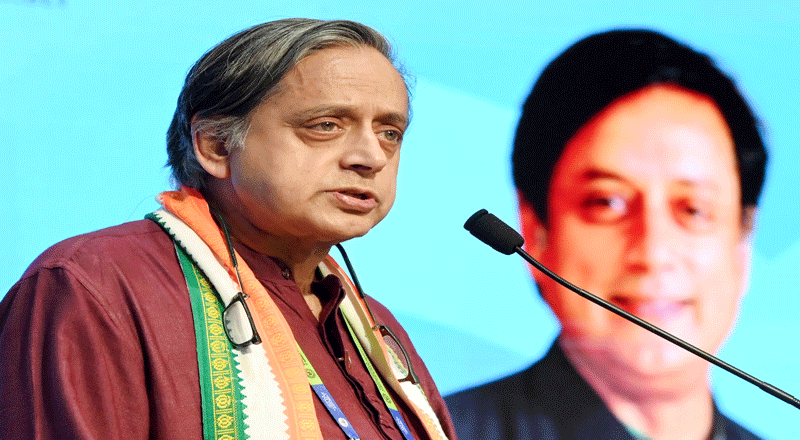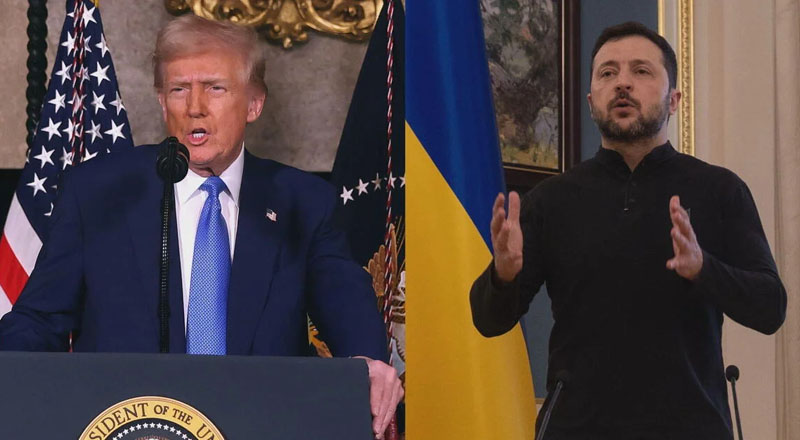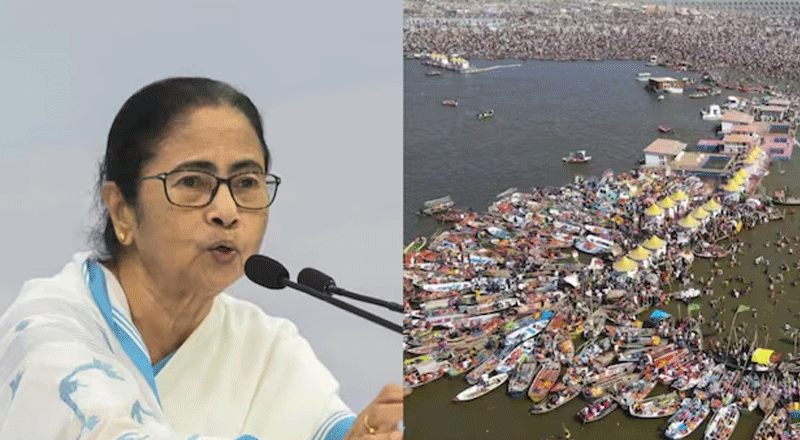The visit saw a soft launch of the ruling alliance’s BMC poll campaign, veiled attack on Uddhav Thackeray and outreach to the aspirational voter
A soft launch of the BJP-Balasahebanchi Shiv Sena (BSS) campaign for the elections to the Brihanmumbai Municipal Corporation (BMC), the richest civic body in India, a veiled attack on the Shiv Sena (Uddhav Balasaheb Thackeray) and its first family, a push for development to appeal to the aspirational voters and an attempt to overcome the linguistic divide. These are among the key takeaways from Prime Minister Narendra Modi’s visit to Mumbai on January 12.
Modi inaugurated projects worth over Rs 38,000 crore, including two metro railway lines, sewage treatment plants, concretisation of 397 km of roads, and neighbourhood clinics. He also laid the foundation stone for three civic hospitals, the redevelopment of the iconic Chhatrapati Shivaji Maharaj Terminus, and launched the loan transfers of around 118,000 beneficiaries under the PM SVANidhi Yojana for street vendors.
BMC poll campaign
Right from the word go, Modi’s tour of Mumbai was a soft launch of the ruling alliance’s election campaign. The elections to the BMC and other municipal corporations and councils in Maharashtra are due later this year. This is being seen as the penultimate battle or the semi-final for the Lok Sabha elections and later, the state assembly elections due in 2024.
The BJP-BSS combine, which came to power after chief minister Eknath Shinde engineered a vertical split in the Shiv Sena legislature party, faces its litmus test in these local body polls.
With a budget of over Rs 46,000 crore, the BMC is the richest municipal corporation in India, and the BJP-BSS combine is preparing to wrest it from the Shiv Sena (Uddhav Balasaheb Thackeray). The Shiv Sena has controlled the BMC from 1985-1992 and from 1997-2022 and used this to nurture a “reward economy“ to strengthen its organisational muscle in Mumbai. The BMC elections are a do-or-die battle for the Sena’s Uddhav faction. The ruling alliance hopes a setback in the BMC polls will send a section of the Uddhav faction cadre migrating to it for the perks of power.
Targeting the Thackerays
Though Modi, Shinde, and deputy chief minister Devendra Fadnavis did not name former chief minister and Shiv Sena (Uddhav Balasaheb Thackeray) president Uddhav Thackeray or his son Aaditya Thackeray, they lashed out at them and the Sena for their stewardship of the BMC.
For instance, Fadnavis charged that the Rs 17,200 crore plan to build seven sewage treatment plants, with a combined capacity of around 2,460 MLD, had been delayed due to rent-seeking by those in control of the BMC. Shinde charged that “some people” were trying to create hurdles in the plan to concretise all city roads. Aaditya had earlier alleged that there were irregularities in the project and raised environmental concerns.
Modi too stressed that funds meant for Mumbai must be deployed at the right place.
* Wooing the aspirational voter
Modi’s development pitch was aimed at the young, aspirational and cosmopolitan voters. Calling upon people to elect the BJP-BSS to power in Mumbai, he stressed on the need for a “triple engine” sarkar, implying that having the BJP in power at the Centre, in the state and in the BMC would propel the city’s development. Modi promised that “Mumbai will be transformed” in the years to come.
More crucially, Modi alluded that politics had hampered the development of Mumbai. This may be a reference to the erstwhile Maharashtra Vikas Aghadi (MVA) government’s move to relocate the car shed for the 33.5 km Metro III (Colaba to SEEPZ) project from the Aarey Milk Colony, which is one of the city’s few green lungs. The BJP-BSS government has since rescinded the decision, which had caused a stalemate.
BJP and even Shiv Sena leaders say that the young, first-time and cosmopolitan voter can overcome the linguistic divide if presented with an agenda that taps into their aspirations.
* Bucking the linguistic divide
It was not a coincidence that Modi began his speech in Marathi and made mandatory references to icons like Chhatrapati Shivaji Maharaj. Shinde too referred to the “warm ties” between Modi and late Shiv Sena supremo Bal Thackeray, who continues to enjoy a talismanic appeal over the party faithful over a decade after his demise (2012). The ‘Aapla Davakhana’ project to strengthen Mumbai’s health infrastructure has also been named after Bal Thackeray.
Though no community, caste or linguistic group votes as a monolith, the Shiv Sena largely enjoys the support of the Marathi-speakers in Mumbai, while the BJP is seen as a party of non-Maharashtrians and mercantile groups. Of course, the BJP has strong pockets of support among upper-caste Maharashtrians like the Brahmins, while the Sena too has voters from non-Marathi catchments like the Gujaratis, Marwaris, Jains and South Indians.
In Mumbai, politics is largely based on linguistic identity. The Marathi speakers, especially those from the working class, live out the paradox of being not the majority, but the largest minority in the capital of their state. The Shiv Sena hopes that the ‘Marathi manoos’ will close ranks with it due to linguistic polarisation and the propaganda about Mumbai being severed from Maharashtra and being converted to a Union territory.
On the other hand, the BJP hopes that the alliance with the BSS will lead to some Marathi-speakers transferring their loyalties to them. The BSS claims it represents the “real” Shiv Sena and has taken over the ideological mantle of Bal Thackeray.
Shinde said that the “common thread” running through Bal Thackeray and Modi’s credos was “pride for Hindutva”. The BJP and BSS allege that the Shiv Sena, which turned towards radical Hindutva in the late 1980s, has diluted its commitment to the cause under Uddhav Thackeray by allying with the Congress and the Nationalist Congress Party (NCP).
The Sena, in turn, also hopes to get some incremental votes of Muslims and Roman Catholic Christians to defeat the BJP. This harping on the issue of a compromise with Hindutva will make it tough for the Uddhav-led Sena to openly solicit votes from these sections, admit his party leaders.





